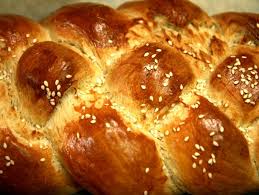
It’s Friday afternoon and I’m queasy. This quarantine is hard enough but the Shabbos brings on additional restrictions—no internet, no telephone and now because of the virus I can’t attend synagogue services or host guests.
Thankfully I can cook. Here in our little Jerusalem suburb nothing is in short supply except eggs but the day before travel restrictions went into effect my sons bought two large trays containing 36 eggs each, more than I usually own at one time.
Cooking is a strange dance of gloving up, glove washing, glove removing, handwashing and hand sanitizing. This week I don’t braid my challahs. I can’t braid in gloved hands and I want to avoid prolonged contact between my hands and the dough, even though my hands are clean so my Shabbos loaves will look like weekday loaves. I hope my family won’t be too disappointed. I’m not looking forward to this Shabbos—I don’t know how I’ll cope with the intensified isolation.
Finally Shabbos comes in an hour later than last week since we’ve just switched to summer time. Outside the skies are grey—winter has yet to leave us.
As I light candles I ask G-d to watch over my family and the whole world. The whole world. I’ve never prayed for the whole world before. Before COVID-19 I prayed only for my family, friends, neighbors, fellow Jews but we’re all in this together, the whole planet and somehow the barriers have fallen away. We’re all humans, all facing the same challenge and we all need G-d’s blessing.
After candle lighting I go outside. Here in Israel we can venture 100 meters from our homes. Roughly three city blocks, not much of a walk but in many countries even that isn’t allowed. On a normal Friday evening the streets are full of children, mothers pushing baby carriages and men running to services but tonight it’s mostly empty.
All around me I hear the sounds of prayer. The men of our town are praying outside now in parks, parking lots, public plazas anywhere they can stand two metres away. All around me I hear the ancient hymn that welcomes the Sabbath “Come my beloved” “Lecha Dodi lekras kala pnai Shabbos nekabla.” The sound surrounds me, the voices blend in stereophonic harmony.
At home we eat our usual Shabbos fare, salmon, chicken soup, roast chicken. The table is set with a white tablecloth and our best china as it is every Shabbos. This week we spent almost two hours at the table. My sons quiz my husband about the virus and my husband answering their many questions.
Other weeks, non COVID-19 weeks, my sons are away for Shabbos. When they are at home they often crash out on the couches well before desert. I’m reading a book about daily life for Jews in Nazi Germany. The book describes an intensification of family life, the family closing ranks, drawing closer as the outside world contracts. For years I’ve bemoaned my family’s lack of connection. Could this COVID-19 Shabbos be the answer to my prayers?
In the morning I attend services in a park. I dress warmly but the March winds rip through my coat. I stay long enough to hear the kaddish prayer—according to Jewish tradition that annuls evil decrees and receive the priestly blessing, “May the Lord bless you and keep you. “
At lunch there is another long back and forth between my husband and one of my sons on the meaning of perfect pitch, father and son bonding over their shared love of music.
In the afternoon I visit a widow who lives alone. As soon as I hear her open the door I leap two meters back. She remains inside her door while I stand outside in the cold. We’re socializing and social distancing at the same time.
Last week the final hours of Shabbos were marred by a public announcement of the discovery of a new case pulling more people into quarantine. Our town was one of the first to be hit. Many cases, thousands in quarantine. For a while we were on the news as the local epicenter but this Shabbos the loudspeaker is silent. No new cases for five blessed days. We are flattening the curve.
On Saturday night I listened to Rabbi Moshe Weinberger speaking from New York. “You will always remember this time,” he promises. “Pray and be joyful.”
The prayers and the joy will carry us through and they have.
Carol Ungar lives in Telzstone, Israel.
